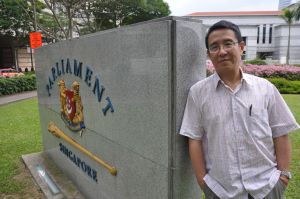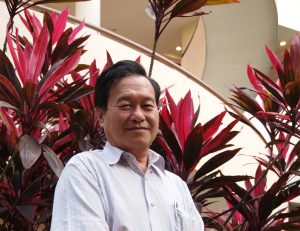by
CHERIAN GEORGE
October 4th, 2011
Text of a presentation at the IPS conference on the Impact of New Media on General Election 2011, 4 October 2011.
One major development facilitated by the internet has been the growth of amateur or “citizen” journalism, marching to the beat of a different drum. Alternative media start from scratch with little institutional baggage and few organisational restraints. With such low barriers to entry, they are able to pick from a wide range of possible strategies.
My research focussed on the strategic choices made by four prominent websites: The Online Citizen, Temasek Review, Yawning Bread and the Singapore General Election Portal. I was not really motivated by the question of whether the GE was an “internet election”. Rather, the intensity of online activity during the elections made it a great opportunity to observe blogs in action, in order to understand better a phenomenon that is sure to grow in importance.
I was particularly interested in their policies towards regulatory obstacles, their thinking about fairness and balance, and where they situate themselves in relation to public opinion.
Responding to regulation
First, how did the websites respond to regulatory constraints? The rules for online election advertising were significantly liberalised in time for the 2011 election, but there was also a new restriction in the form of Cooling Off Day.
For bloggers, this was a grey area. The letter of the law exempted only licenced news media – so unlicensed citizen media were presumably covered by the rule. But since citizen journalists consider themselves to be fulfilling the same function as news organisations, it could be argued that they have the same justification as mainstream media to report and comment on the elections.
So would bloggers choose to observe the letter of the law or take the calculated risk that no action taken against them if they claimed for themselves the same right to publish as mainstream media?
Well, Tan Kin Lian’s Singapore General Election Portal decided to respect the new restriction and ceased posting at 11pm the night before Cooling Off Day. Yawning Bread’s Alex Au (below) ignored the regulation and published a 1,600-word review and commentary on Cooling Off Day.
When I interviewed him before the GE, Andrew Loh said that he was inclined to challenge the restriction. “On principle, it’s ridiculous that there are media that are not subject to the rule while ordinary citizens are not allowed to speak up,” he told me. Loh managed the GE coverage for TOC and, sure enough, posted one article on Cooling Off Day and another on Polling Day.
The behaviour of bloggers in 2011 was thus a continuation of what we saw in 2006, when there was some confusion about what exactly was permissible. Most simply ignored what they considered to be unreasonable restrictions and just went ahead. Once again we’ve seen that blanket bans are simply not going to be universally respected.
More specific legislation such as defamation and contempt of court are a different matter. Those who operate openly and within Singapore’s jurisdiction do not take chances with these laws. The Online Citizen told me that it did receive a lawyer’s letter regarding a posting that defamed a PAP politician. The posting was put up by a reader in the comments section under one of its articles and was duly removed by TOC editors.
The same comment was apparently circulating in Temasek Review, which is of course harder for regulators or lawyers to reach.
This raises the question of why more blogs don’t simply go underground the way Temasek Review has. Note that when Sintercom was asked to register before the 2001 election, it chose to wind up and resurfaced overseas. When TOC was asked to register and gazetted as a political association, it responded by throwing a party, to signal to its supporters that it is hear to stay.
The contrast between the strategies of Temasek Review and The Online Citizen is illuminating. On the one hand, TR’s underground guerilla approach to journalism made it Singapore’s top rumour site. Many seem to value its whistleblower function and are willing to tolerate the fact that it is wrong most of the time if it is right once in a while.
TOC is more exposed to political risk and has to be more careful. Arguably, however, this limitation is more than outweighed by the benefits of being able to network face to face in Singapore.
As long as citizen journalism remains a largely voluntaristic enterprise, it will be highly dependent on relationships of trust, and TOC has clearly been able to leverage on that. It has been moderately successful in getting donations and was very effective in drawing volunteers. They have also been able to work with civil society organisations and are playing a leading role in progressive movements.
The clearest sign of the benefits of TOC’s transparency was its success in organising the pre-election inter-party forum last December, followed by the presidential debate in August.
Fairness and balance
Second, how do the blogs interpret the norms of fairness and balance in journalism?
These principles have been central to professional journalism for around a century. However, their centrality to journalism’s mission has always been somewhat problematic and contested, as there is an even longer tradition of partisan journalism, and questions remain about how balance and independence are to be interpreted.
The most striking characteristic of Singapore’s political blogs is that they are all on the same side of the ideological fence: all identify with the opposition underdogs and try to level the political playing field.
“The mainstream media covers more establishment views. We try to balance it with other views,” said SGEP owner Tan Kin Lian (below). Added Gerald Ho, who edited the site day to day, “The field is lopsided. Even if we don’t put out the mainstream media view, you’ll still get to know it.”
Such blogs are not necessarily pro-opposition by policy, but believe that the best way they can contribute is to provide a platform for such voices that are under-served by mainstream media. Said Andrew Loh, “We are not supportive of any opposition party, but we recognise that they don’t have a platform.”
These websites do not believe it is their responsibility to aim for balance within their websites, claiming instead to provide a counterweight on an already unbalanced media landscape.
“We have never claimed to be ‘balanced’,” said Andrew Loh. Joshua Chiang, who was TOC editor shortly before the election, added, “We are the balance.”
Thus, critics who accuse the blogs of being unfair or one-sided are right, but should realise that their criticism is missing the point and is unlikely to cause bloggers sleepless nights. Their goal is a more balanced media system, not necessarily more balance within their individual blogs.
Public opinion
Third, where do they situate themselves in relation to their audience?
Most journalists will say that their first duty is to the public. And most blogs brand themselves as representing a more authentic discourse than the mainstream media. So one might expect that these political sites position themselves firmly on the side of public opinion.
While this is probably true of Temasek Review, the editors of all the other sites surprisingly expressed some disappointment with the public.
They were not comfortable with simply following public opinion because they did not trust prevailing popular sentiments on many of the issues they care about.
Alex Au put it most candidly: “I’m engaging in a war with my readers. It annoys me to no end.”
He and other like-minded bloggers, especially in TOC, know from experience that some of the progressive causes that are dear to their hearts – such as gay rights, foreign worker rights and the dealth penality – are not popular with the masses.
Therefore, the task of winning votes for the opposition was less important than raising the level of political maturity of Singaporeans, including opposition supporters.
Temasek Review on most days may have more traffic than TOC, Yawning Bread and SGEP, but the latter sites do not think of themselves as taking part in a popularity contest. They of course tracked their page views and unique visitors – and drew immense satisfaction from rising numbers – but they were reluctant to let this dictate their sense of what is important.
These bloggers I interviewed see themselves in a long-term struggle, in which the quality of the debate matters as much as their outreach or the election outcome. As Gerald Ho put it, “We don’t bother about numbers. Even if it’s just 1%, let’s make that 1% secure.”
Joshua Chiang (below) said, “It’s pointless to change the government if the people are still the same. It’s not our agenda to change the government. It’s to inform and educate people.”
The attitude of these editors to mass opinion is most apparent in the policies on reader comments. At one extreme, Temasek Review practices no moderation, while at the other, Alex Au is resolute in his policy of pre-moderation. He is unapologetically elitist as far as the standard of writing goes: comments are only approved if they meet his benchmarks. “I want to raise the IQ level of political discourse,” he said.
Such diversity in approaches to managing blogs should not be surprising –the distinction between mass market, popular tabloids and the elite press was found in journalism long before the arrival of new media.
This and the other editorial choices that I have outlined are ultimately dilemmas with no obvious answers. They involve trade-offs, reflecting unresolved tensions in the democratic role of journalism. We can be sure that alternative media will continue to evolve in Singapore, and we can be equally sure that they will not converge around a set of common norms. We can expect them to continue to be fragmented and diverse in their interpretations of their journalistic mission.



Be the first to comment on "Diverse strategies in political blogs’ election coverage"